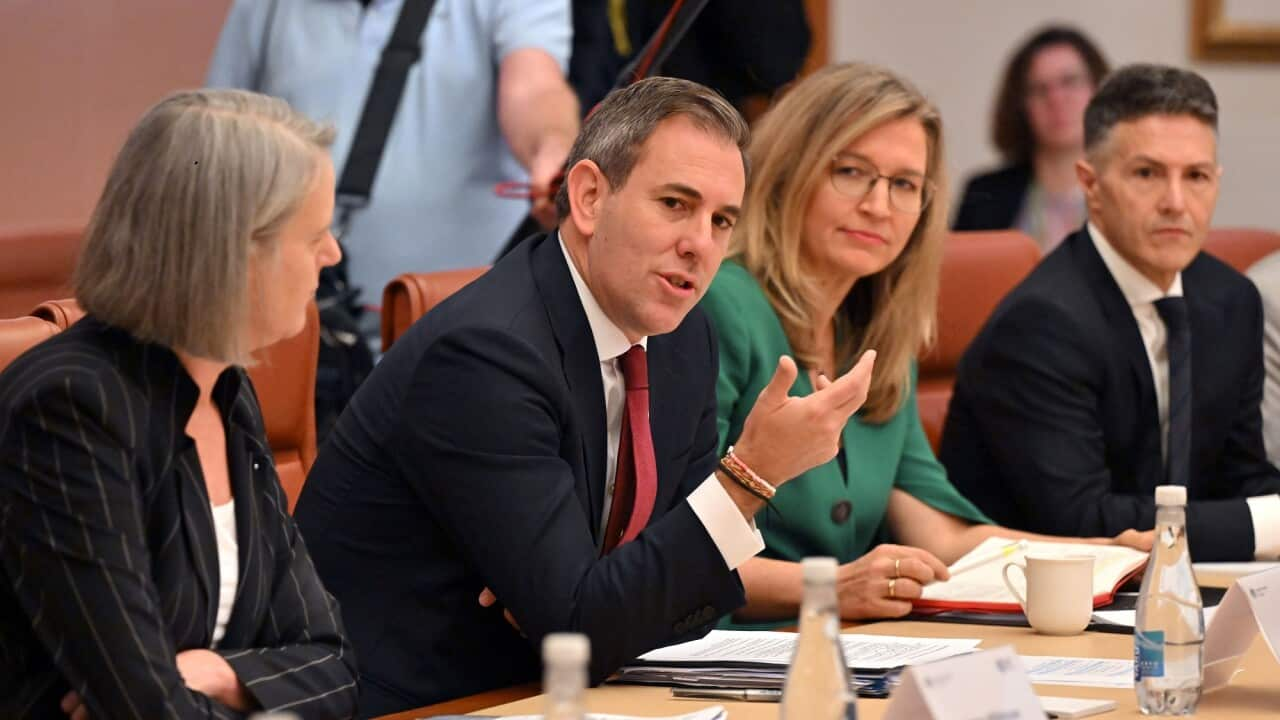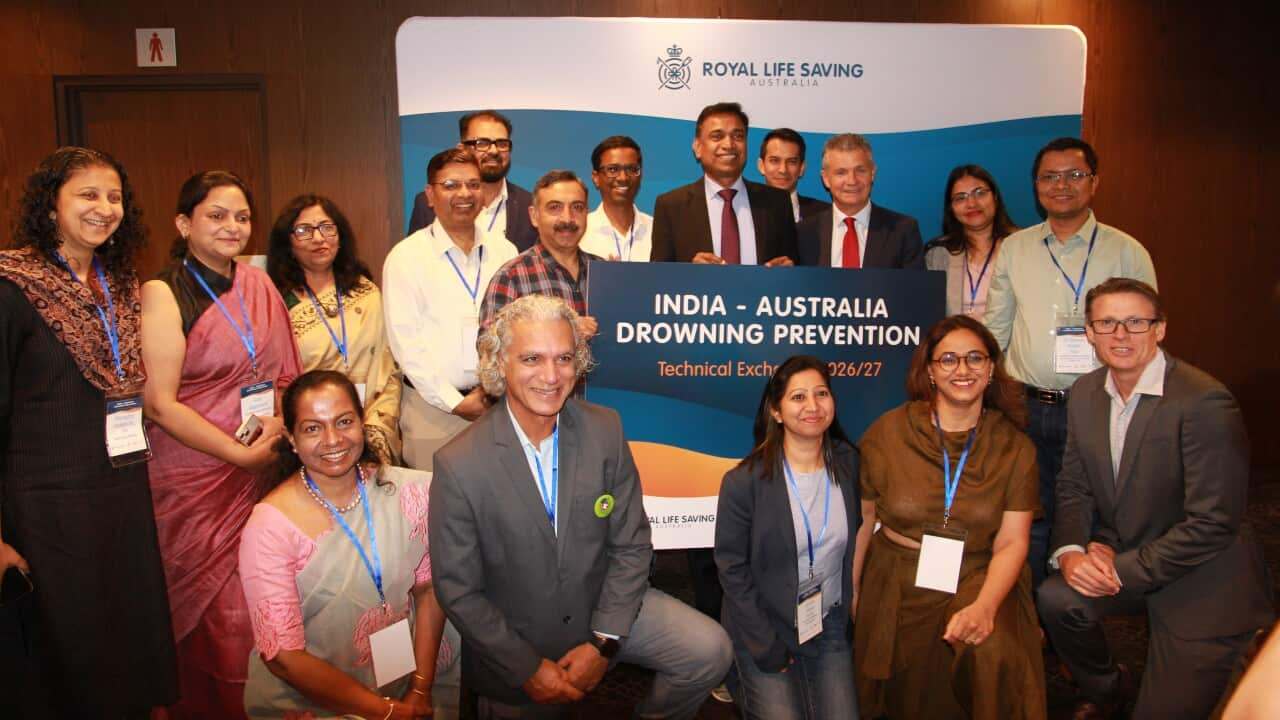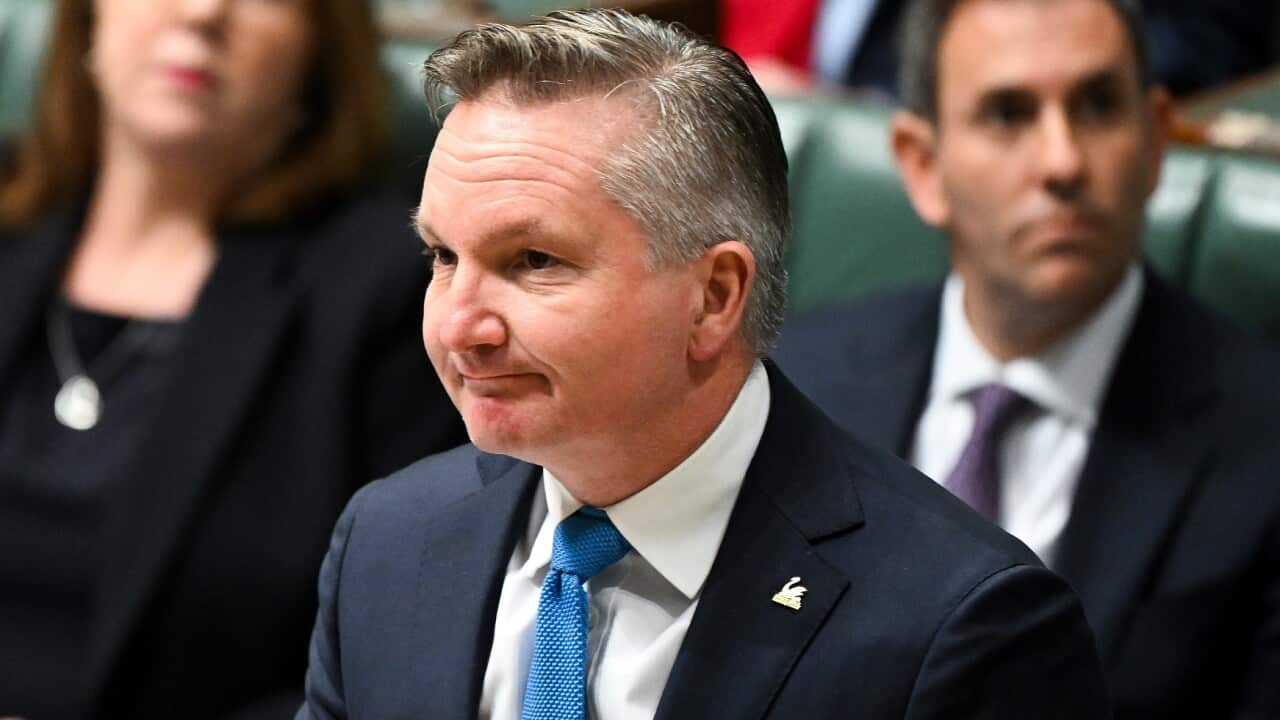Listen to Australian and world news, and follow trending topics with SBS News Podcasts.
TRANSCRIPT
The government's long-awaited economic roundtable has drawn to a close.
Some called it a talkfest, others a waste of time, but to the Treasurer, this was an opportunity to build the momentum needed to place Australia's sliding productivity back on a path of growth.
After over 900 submissions, 40 preliminary roundtables, five interim reports, and 29 hours of closed-door discussions, Jim Chalmers says consensus was reached in several areas.
"There were clear and broad areas of consensus, probably more than I was anticipating in the breadth and depth of the views that people shared - and where those views connected."
Wrapping up the three-day summit, Dr Chalmers announced ten reform directions the government intends to pursue.
"Our progress towards a single national market, which is how we improve the Federation, modernis e the Federation. The second one is about simplifying trade and reforming tariffs. The third one was better regulation and how we cut the clutter when it comes to reg. The fourth one was speeding up approvals in national priority areas. The fifth one was building more homes more quickly. The sixth one was how we make artificial intelligence a national priority for Australia. Seven was attracting capital and deploying investment. Eight was building a skilled and adaptable workforce. Nine was a better tax system, and 10 was modernising government services."
Reforms in these ten areas, according to the Treasurer, will help achieve what he says is the holy grail outcome: higher productivity and, in turn, higher living standards.
Let's take a look back at the three-day summit and hear from some of the key stakeholders, to get a glimpse into how this agenda was formed.
On day one, discussions centered around creating a resilient and dynamic economy.
With skills and training on the agenda, early tensions emerged between the Business Council - which represents employers - and union groups, which represent employees.
Union leaders, like ACTU Assistant Secretary Liam O'Brien, were calling for a new 1.5 per cent payroll levy on businesses with a turnover of above $500,000 to fund worker training.
"I think there is an acknowledgment that we have a problem in this country when it comes to employer investment in training. There is absolutely disagreement about how we get to the solution. Our movement firmly believes that the way in which we do that is to drive that transformation within businesses with a levy. That is the sort of thing that will require employers to make those necessary investments in skills and education."
The chief executive of the Business Council of Australia, Bran Black, says employers don't agree.
He says the government should incentivise training investment rather than tax companies for it.
"From business perspective, we just don't see that taxing the business community is the right way to deliver the outcome that Australia needs."
Day one of the summit also focused on improving economic resilience amid global trade challenges.
Shiro Armstrong, a professor of economics at ANU, addressed the roundtable on how to deal with the domestic impacts of global uncertainty.
He told Sky News there was a consensus around removing more nuisance tariffs.
"These are tariffs that are very low already. They're not protecting any industries, but they cost more in compliance than they bring in revenue. So they're just an inefficiency in the economy that is important to get rid of."
On day two, talks turned to regulatory red tape and artificial intelligence.
One key productivity barrier identified by the Productivity Commission was the number of regulatory barriers they say are delaying progress on new project approvals.
Faced with the challenge of removing burdensome regulations while protecting communities and the environment, Dr Chalmers opened day two, promising some win-wins.
"How can we quicken the pace of approval, so that we can build more of the stuff that we all want to see in our economy? Important focus today on competition and dynamism in the context of the Federation, as well. Making the Federation work more effectively in the interest of the states and territories and the Commonwealth and the national economy. I think there should be a lot of win-wins there."
Also under scrutiny was the progress on achieving the national target to increase housing supply by building 1.2 million new homes by 2029 [[what's called the National Housing Accord.
A barrier identified was the expanding list of minimum requirements for buildings in Australia - under the National Construction Code.
Housing Minister Clare O'Neil says there is broad support over the need for a pause to the code until mid-2029.
Changes to the code that deal with safety issues, such as fireproofing, would be exempt from a pause.
Ms O'Neil says the government must understand which regulatory barriers are doing more harm than good.
"One of the really big problems that we know we can find in housing is this absolute impenetrable thicket of red tape that's faced by builders. I talked to a builder the other day who said to me, you know, Clare, back in the day, the hard part was building a home. Now it's getting the approvals, getting through the delays in the bureaucracy."
There was broad agreement about the need for better regulations around construction, but not all were on board with the idea of pausing the code.
Australian Council of Social Service chief executive Cassandra Goldie raised concerns that it could lead to poorer quality in the homes built.
"The last thing we should be doing is building houses that are uninsurable, or at real risk of becoming so within a few years."
Day two also saw some consensus about reform to Australia's main environmental law - the Environment Protection and Biodiversity Conservation Act - which protects nationally significant animals, plants, habitats or places against the impacts of any new developments.
Critics say the legislation is seen as outdated and ineffective.
Kelly O’Shanassy, the Australian Conservation Foundation chief, says there was more agreement on the need for change than she had anticipated.
"Whilst there's certainly some things I disagree with the minister on, he very clearly said today we need national environmental standards, we need a national regulator, and we need to have better, more efficient processes with the states. And I agree with all of that and really, so did everyone else around the table."
Artificial Intelligence was also top of mind, with business and union leaders holding diverging views.
Ahead of the summit, Productivity Commission head Danielle Wood told the National Press Club that AI could lift the average worker’s income by $4,300 per year over the next decade.
She did concede some jobs will be lost to AI, but she says that's why investing in reskilling the workforce is also crucial for growth.
"We have new research from Jobs and Skills Australia that says probably the biggest impact on the labour market will be job augmentation, us working with the AI and changing the nature of our jobs, as opposed to job loss. But there invariably will be some job losses. I think, really importantly - and what we should have learned from pathways of reform - is that you can't leave people behind."
Backing a more worker-centric approach, ACTU boss Sally McManus says it has to be everyday people who benefit from the technology.
She says a breakthrough was made on day two, with a consensus reached on the need for a fair model for AI in the workplace, one that protects workers.
"A big outcome of the roundtable is the fact that there is agreement that we are going to give this a real good go at coming up with a model to make sure that people are actually paid for what they produce. So, that's a big thing."
When building a skilled and adaptable workforce, the government has also been urged to address the high rates of skilled-migrants working below their skill level.
Research* by Deloitte Access Economics found that almost half (44 per cent) of permanent migrants in Australia - that's 620,000 people - work below their skill level.
Non-profit Settlement Services International commissioned the research.
The group says they have built bridges across sectors, to back the Activate Australia's Skills campaign, which proposes one national governance system for all overseas skills and qualifications recognition, overseen by an ombudsman.
Dane Moores is the head of strategic relations at Settlement Services International and the campaign manager for Activate Australia's Skills.
"It's stopping qualified people from working to their full potential and filling skills shortages. Due to barriers that are not related to their skills. So the current system, it's really expensive, it's slow, incredibly confusing. For some professions it can cost tens of thousands of dollars to go through the application process and it can take months, if not years, to get an outcome."
Allegra Spender, the only Independent invited to the roundtable, says it's something that must be addressed.
"I've met these people in my constituency, where people come up and say, I got a skilled visa, and then I can't actually work. I have to go back and be apprentice, even though I've been qualified in the UK."
The final day saw discussion held on tax reforms, budget sustainability, and reforms to the care economy.
The federal opposition spokesman on treasury affairs, Ted O'Brien, says the government should commit to time-bound targets to reduce regulation, and introduce rules to contain spending and support budget repair.
He also raised questions around the cost of Australia's energy policy.
"My recommendation to the government is that it should do something it's never done before, which is a total system cost analysis to find the cheapest pathway possible to have an electricity grid that it can manage that has to be reliable and decarbonise over time. I am concerned that the government is going to double down on an energy policy which is already failing."
Ahead of talks on budget sustainability, the government announced that some children with autism will be moved off the NDIS and into a separate program called Thriving Kids.
The NDIS is the budget's third-largest expense and is set to cost taxpayers more than $52 billion in the financial year ending June 30, 2026.
Disability Minister Mark Butler says the changes are needed to ensure the sustainability of the NDIS.
But opposition health spokesperson Anne Ruston says more clarity is needed for the parents and families impacted.
"It's created great uncertainty for families of these children. It creates great distress. So we're asking the Minister to come out and provide that level of certainty, because we can't be sure that these programs are right or otherwise unless we have that sort of detail."
Among the immediate reforms announced, Dr Chalmers says he will also progress a road user charge, amid concern in some quarters that electric vehicle drivers aren't captured by the fuel excise tax.
A list of options for a model for the road user charge will be developed by state and territory treasurers by September 5.
Dr Chalmers also says Labor will introduce a long-awaited overhaul to national environmental laws before Christmas, with agreement on an expedited process.
On tax reforms, the Business Council's Bran Black says the government must act on the goodwill from the summit and implement the reforms raised in the roundtable.
Treasurer Chalmers says he wants to address tax reform to ensure the system is fair and equitable across different generations.
"I think our tax system is imperfect and one of its most troubling imperfections is best seen through an intergenerational lens. And what I mean by that, and really almost everybody around the table had a similar view, which is we take our responsibilities to the coming generation seriously."













